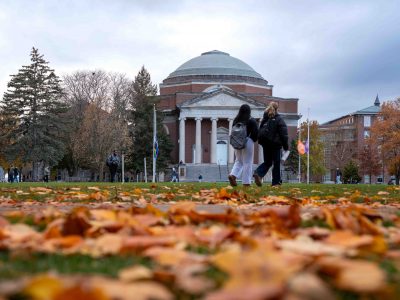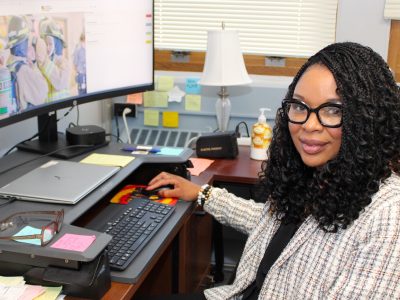2025 Is a Strong Year for NSF Proposal Funding, Early-Career Faculty Awards
National Science Foundation (NSF) funding for Syracuse University faculty research projects totaled $19.7 million in fiscal year 2025, an increase of $5.8 million over last year’s total, according to the Office of Research.
NSF also recognized four faculty members with prestigious Faculty Early Career Development (CAREER) Awards.
Duncan Brown, vice president for research, says expanded NSF funding and the selection of four faculty for CAREER recognition is a testament to the strength, quality and innovativeness of research taking place across campus. “Such positive outcomes show how important it is that our researchers continue to apply for federal grants. Doing so helps assure that continuing projects can maintain their momentum without interruption and that new research ideas have the support they need to realize societal impact,” says Brown.
CAREER Awards
CAREER Awards are NSF’s highest recognition for early-career academic professionals. The awards are designed to help recipients build the foundation for a lifetime of leadership and integration of education and research. Receiving the awards this year are:
- Xiaoran Hu, assistant professor of chemistry in the College of Arts and Sciences
- Bryan Kim, assistant professor of electrical engineering in the College of Engineering and Computer Science
- Georgia Mansell, assistant professor of physics in the College of Arts and Sciences
- Baobao Zhang, Maxwell Dean Associate Professor of the Politics of AI in the Maxwell School of Citizenship and Public Affairs

Hu works on new ways to make molecules and materials that are super sensitive to mechanical forces and that can show visible signs, like changing color, when they are deformed or damaged. This helps materials report damage on their own and makes it possible to study how subtle force moves through complex systems, such as synthetic plastics and biological materials. He also designs smart materials that adapt their behavior or properties in response to other triggers, such as ultrasound, light or chemicals.
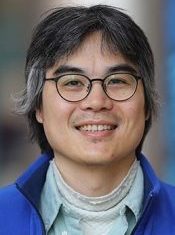
Kim aims to bridge the information gap between software systems and hardware devices by embedding implicit hints between systems and devices. The research helps improve data storage performance and data retrieval reliability while maintaining compatibility. It supports complex, large-scale computing needs of modern businesses and technologies such as artificial intelligence and big-data analytics.
Mansell builds and fine tunes interferometric ground-based gravitational-wave detectors, the tools that detect the tiny ripples in space caused by cosmic events such as black hole mergers. She also works with a special kind of light called “squeezed light” that helps make the detectors more precise.
Zhang uses quantitative methods to study how the interests of citizens and technical experts could shape the governance of emerging technologies. She explores the politics of digital technologies regarding AI governance; the international political economy in the age of advanced automation and quantitative social science methods.
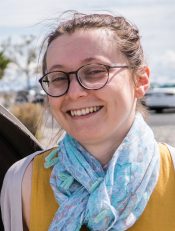
Record Year for NSF Funding
The $19.7 million in awards is the highest amount since 2022, according to Chetna Chianese, senior director in the Office of Research Development (ORD). She says the success highlights the faculty’s continued striving for research success regardless of a shifting federal funding landscape.
The NSF funding supports dozens of projects across five schools and colleges in multiple research areas, including:
- An interdisciplinary training program for doctoral students in emergent intelligence biological and bio-inspired systems for the BioInspired Institute
- A cluster of three projects to support the Center for Gravitational Wave Astronomy and Astrophysics
- One new and two renewed Research Experiences for Undergraduates projects
- A project to further explore new physics at the LHCb experiment at CERN, the European center for nuclear research
- A training program for upskilling photonics technicians in advanced optics and quantum research-enabled technologies
- A project to explore the science of social-psychological processes and AI companionship
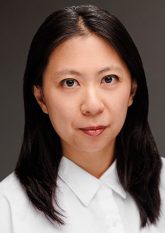
Support for Proposals
The Office of Research offers broad support for faculty pursuing sponsored funding, including through Office of Sponsored Programs, departmental research administrators and ORD. Faculty beginning to pursue external funding and resources to support their research and creative activities can start by working with ORD staff, who bring deep knowledge of external funders and stakeholders to provide strategic consultations. The Office of Research additionally supports faculty through the NSF CAREER Cohort Program, which helps them plan, draft and complete their proposals. That program will resume in the spring semester ahead of the summer 2026 deadline.
ORD also provides guidance regarding the ongoing changes to federal funding, the changing federal funding landscape, updates on new executive orders and adjusted administrative policies and regulatory requirements. “We are keeping faculty updated via email and an internal SharePoint, but our team can also provide project-specific guidance to principal investigators who reach out to us,” Chianese says.
Faculty interested in applying for NSF and other grants can contact the ORD staff at resdev@syr.edu.
